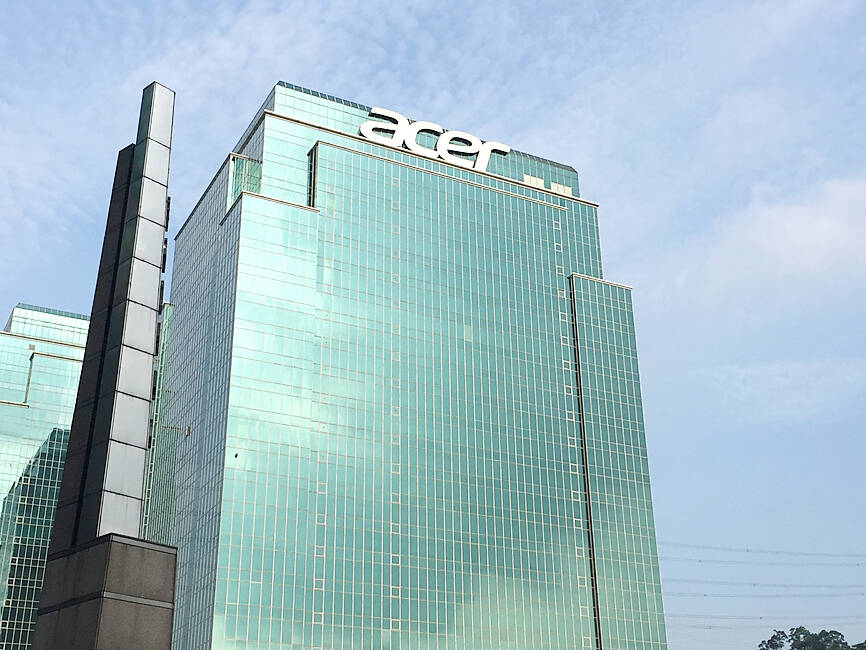PC brand Acer Inc (宏碁) yesterday reported that its net profit last year totaled NT$4.93 billion (US$156.5 million), down 1.43 percent year-on-year, as the firm recorded falling revenue and profit margins.
Last year, earnings per share (EPS) fell to NT$1.64, from NT$1.67 the previous year, Acer said in a statement.
The announcement came as the company released its financial results for the final quarter of last year.

Photo: Vanessa Cho, Taipei Times
Its net profit came in at NT$1.02 billion, compared with net losses of NT$832 million during the same period a year earlier.
EPS rose to NT$0.32 in the quarter, compared with losses per share of NT$0.28 the previous year, Acer said.
While last year’s net profit registered the lowest level in four years, the company’s board of directors has proposed distributing a cash dividend of NT$1.6 per share, Acer said.
If approved by shareholders on May 31, the planned cash dividend would represent a payout ratio of 97.56 percent.
Based on the company’s closing share price of NT$45.9 yesterday, it would translate into a dividend yield of 3.49 percent.
Acer’s full-year revenue last year decreased 12.39 percent year-on-year to NT$241.31 billion, affected by still weak PC and consumer electronics demand amid a global economic slowdown, while gross margin and operating margin declined to 10.7 percent and 1.8 percent respectively.
Despite the lackluster performance last year, Acer has maintained a confident outlook for its business this year, aided by sales related to artificial intelligence (AI) applications, it said.
“Acer’s computer and display business has returned to the right track of profitability and seasonality while inventory is under control. The company is optimistic about the business opportunities that artificial intelligence brings and considers generative AI to become a megatrend in 2024 and beyond,” the statement said.
Three of Acer's subsidiaries — Acer E-Enabling Business Inc (宏碁資訊), Acer Medical Inc (宏碁智醫), Altos Inc (安圖斯科技) — focus on enterprises AI products and services, while the parent company itself is working with major global brands on AI PCs.
In the recent few years, Acer has continued to diversify its business by setting up more subsidiaries amid muted PC business growth, with businesses other than computers and displays contributing 42.8 percent to its total operating profit of NT$4.23 billion last year, the company said.
Acer's subsidiaries span various fields, including cyber security, beverages, apparel, home appliances, AI-assisted cloud services, medical solutions, gaming software and hardware, and charging piles.
Three subsidiaries went public last year, giving Acer 12 publicly listed subsidiaries, the company said.

With an approval rating of just two percent, Peruvian President Dina Boluarte might be the world’s most unpopular leader, according to pollsters. Protests greeted her rise to power 29 months ago, and have marked her entire term — joined by assorted scandals, investigations, controversies and a surge in gang violence. The 63-year-old is the target of a dozen probes, including for her alleged failure to declare gifts of luxury jewels and watches, a scandal inevitably dubbed “Rolexgate.” She is also under the microscope for a two-week undeclared absence for nose surgery — which she insists was medical, not cosmetic — and is

CAUTIOUS RECOVERY: While the manufacturing sector returned to growth amid the US-China trade truce, firms remain wary as uncertainty clouds the outlook, the CIER said The local manufacturing sector returned to expansion last month, as the official purchasing managers’ index (PMI) rose 2.1 points to 51.0, driven by a temporary easing in US-China trade tensions, the Chung-Hua Institution for Economic Research (CIER, 中華經濟研究院) said yesterday. The PMI gauges the health of the manufacturing industry, with readings above 50 indicating expansion and those below 50 signaling contraction. “Firms are not as pessimistic as they were in April, but they remain far from optimistic,” CIER president Lien Hsien-ming (連賢明) said at a news conference. The full impact of US tariff decisions is unlikely to become clear until later this month

GROWING CONCERN: Some senior Trump administration officials opposed the UAE expansion over fears that another TSMC project could jeopardize its US investment Taiwan Semiconductor Manufacturing Co (TSMC, 台積電) is evaluating building an advanced production facility in the United Arab Emirates (UAE) and has discussed the possibility with officials in US President Donald Trump’s administration, people familiar with the matter said, in a potentially major bet on the Middle East that would only come to fruition with Washington’s approval. The company has had multiple meetings in the past few months with US Special Envoy to the Middle East Steve Witkoff and officials from MGX, an influential investment vehicle overseen by the UAE president’s brother, the people said. The conversations are a continuation of talks that

CHIP DUTIES: TSMC said it voiced its concerns to Washington about tariffs, telling the US commerce department that it wants ‘fair treatment’ to protect its competitiveness Taiwan Semiconductor Manufacturing Co (TSMC, 台積電) yesterday reiterated robust business prospects for this year as strong artificial intelligence (AI) chip demand from Nvidia Corp and other customers would absorb the impacts of US tariffs. “The impact of tariffs would be indirect, as the custom tax is the importers’ responsibility, not the exporters,” TSMC chairman and chief executive officer C.C. Wei (魏哲家) said at the chipmaker’s annual shareholders’ meeting in Hsinchu City. TSMC’s business could be affected if people become reluctant to buy electronics due to inflated prices, Wei said. In addition, the chipmaker has voiced its concern to the US Department of Commerce